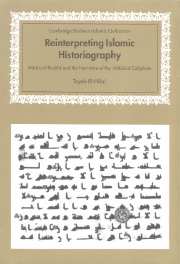Book contents
- Frontmatter
- Contents
- Acknowledgments
- List of abbreviations and note on the dates
- Genealogical table: the line of the early ʿAbbāsid caliphs
- Chapter 1 Historical background and introduction
- Chapter 2 Hārūn al-Rashīd: where it all started or ended
- Chapter 3 Al-Amīn: the challenge of regicide in Islamic memory
- Chapter 4 Al-Maʾmūn: the heretic Caliph
- Chapter 5 The structure of civil war narratives
- Chapter 6 Al-Mutawakkil: an encore of the family tragedy
- Conclusion
- Select bibliography
- Index
Chapter 6 - Al-Mutawakkil: an encore of the family tragedy
Published online by Cambridge University Press: 26 June 2009
- Frontmatter
- Contents
- Acknowledgments
- List of abbreviations and note on the dates
- Genealogical table: the line of the early ʿAbbāsid caliphs
- Chapter 1 Historical background and introduction
- Chapter 2 Hārūn al-Rashīd: where it all started or ended
- Chapter 3 Al-Amīn: the challenge of regicide in Islamic memory
- Chapter 4 Al-Maʾmūn: the heretic Caliph
- Chapter 5 The structure of civil war narratives
- Chapter 6 Al-Mutawakkil: an encore of the family tragedy
- Conclusion
- Select bibliography
- Index
Summary
The succession transition
On one of his many excursions, Hārūn al-Rashīd one day, it is said, decided to take his children on a hunting venture into the countryside. Eager to observe their ingenuity and skill, he gave each suffcient weapons and sent them on independent trails to fetch something on their own. At the end of the day, after everyone had returned from their hunting, the caliph expressed his interest in examining the accomplishments of his sons. As he began the review, he must have found some catches suffciently impressive before it became clear that members of his entourage were scrambling to hide something from him. At the end of the line, the little one, Muḥammad (the future al-Muʿtaṣim), it seemed, had only managed that day to come back with an owl. Since the owl conjured up images of ill-omen, the servants were afraid to reveal it to the caliph, lest the latter vent his anger on the child and/or on those around, and thereby end the entire sojourn on a sour note. Inevitably, however, Muʿtaṣim's turn came up and, after some inquiry, and considerable trepidation, the servants relented and revealed the hefty arrow-pierced bird. A few moments of silence then passed before the caliph suddenly, and to everyone's surprise, brightly congratulated his son on his achievement, then turned to those around, laughed, and solemnly prophesied: “Verily, he shall succeed to the caliphate, and he shall find his supporters to be a people whose visages look like the face of this owl. He shall rebuild an ancient site, and settle it with these people.”
- Type
- Chapter
- Information
- Reinterpreting Islamic HistoriographyHarun al-Rashid and the Narrative of the Abbasid Caliphate, pp. 178 - 215Publisher: Cambridge University PressPrint publication year: 1999



